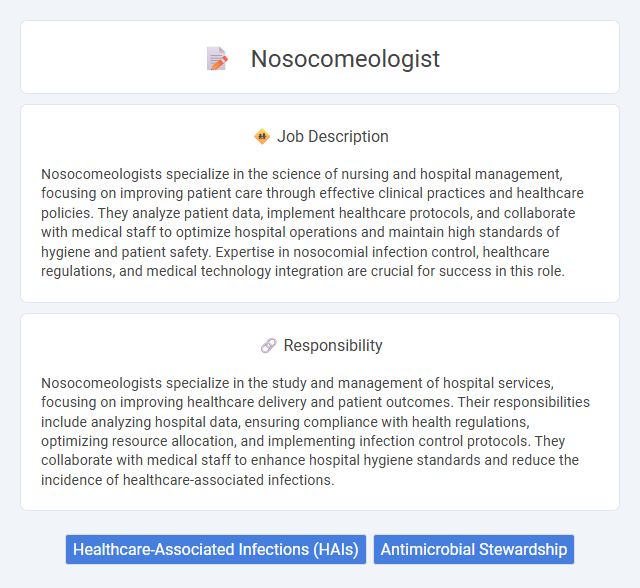
Nosocomeologists specialize in the science of nursing and hospital management, focusing on improving patient care through effective clinical practices and healthcare policies. They analyze patient data, implement healthcare protocols, and collaborate with medical staff to optimize hospital operations and maintain high standards of hygiene and patient safety. Expertise in nosocomial infection control, healthcare regulations, and medical technology integration are crucial for success in this role.
Individuals with a strong interest in healthcare management and a passion for improving patient care conditions are likely to find a career as a nosocomeologist suitable. Those who thrive in analytical environments, enjoy problem-solving, and can handle the complexity of hospital systems may have a higher probability of success in this field. However, people who prefer direct patient interaction or have limited tolerance for bureaucratic tasks might find the role less compatible with their skills and interests.
Qualification
Nosocomologists typically require a strong background in healthcare, often holding degrees in nursing, medicine, or public health. Specialized training in hospital epidemiology, infection control, and healthcare administration is essential for managing nosocomial infections effectively. Certification programs such as the Certification in Infection Control (CIC) enhance qualifications and demonstrate expertise in infection prevention within healthcare settings.
Responsibility
Nosocomeologists specialize in the study and management of hospital services, focusing on improving healthcare delivery and patient outcomes. Their responsibilities include analyzing hospital data, ensuring compliance with health regulations, optimizing resource allocation, and implementing infection control protocols. They collaborate with medical staff to enhance hospital hygiene standards and reduce the incidence of healthcare-associated infections.
Benefit
A nosocomeologist likely benefits from a specialized skill set that enhances patient care and contributes to hospital efficiency. There is a strong probability of improved career prospects and job stability due to the growing demand for expertise in clinical nursing and healthcare management. This role may also offer opportunities for professional development and leadership within medical institutions.
Challenge
Nosocomeologists likely face the challenge of managing complex patient care situations that require precise coordination among medical staff and resources. They probably encounter high-pressure environments where quick decision-making is critical to ensure efficient treatment outcomes. Balancing administrative duties with patient-centered care may also pose significant difficulties in this demanding healthcare role.
Career Advancement
Nosocomeologists specializing in healthcare environment management can advance their careers by gaining certifications in infection control and hospital administration, enhancing their expertise in patient safety and sanitation protocols. Progression opportunities include roles such as senior nosocomeologist, healthcare quality manager, or director of hospital hygiene services, allowing for greater leadership responsibilities and influence over institutional health standards. Continuous education and experience in emerging disinfection technologies and regulatory compliance significantly boost career growth in this field.
Key Terms
Healthcare-Associated Infections (HAIs)
Nosocomeologists specialize in the study and prevention of Healthcare-Associated Infections (HAIs), focusing on infection control measures within medical facilities. Their expertise includes identifying infection sources, implementing sterilization protocols, and training healthcare staff to reduce hospital-acquired infection rates. Effective nosocomeology practices are critical for minimizing HAIs, improving patient safety, and enhancing overall healthcare quality in hospitals and clinics.
Antimicrobial Stewardship
Nosocomeologists specialize in hospital-acquired infections, playing a pivotal role in antimicrobial stewardship by optimizing antibiotic use to combat resistance and improve patient outcomes. Their expertise includes monitoring infection trends, promoting evidence-based prescribing practices, and implementing protocols to minimize the emergence of multidrug-resistant organisms. Effective antimicrobial stewardship led by nosocomeologists reduces healthcare costs, shortens hospital stays, and enhances overall patient safety in clinical settings.
 kuljobs.com
kuljobs.com